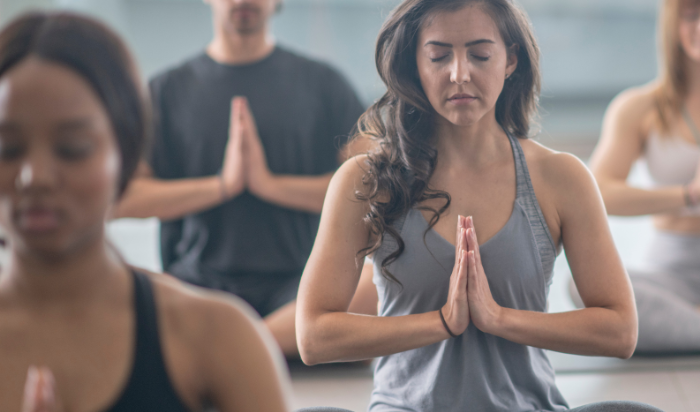The Yamas and Niyamas: How Yoga Helped Me to Follow Jesus
Though I am a lover of Jesus, I have been hesitant at times to use the term “Christian” to describe myself… The phrase ‘follower of Christ’ feels more descriptive of my heart for discipleship. A heart that desires to move my faith beyond shallow belief, and mere head knowledge of God, to actually living a certain “way”. The practice of yoga teaches a way of life and the ethics of yoga have been instrumental in my spiritual formation as a follower of Christ.
Christianity and Yoga: Beyond the controversy
What is Christian yoga? Is yoga a sin? Should Christians do yoga? I hear these questions quite frequently and I understand the concern behind them. How can Christians do yoga when it is a spiritual practice that was birthed through a culture steeped in Hindu and Buddhist philosophies? (To see my answer to this question read my blog Jesus and Yoga) However when I am asked, “Can a Christian practice yoga?” My simple answer, yoga helps me to be a better Christian. To explain, the practice of yoga enables me, in many ways, to live a more fully embodied Christian life:
The physical practices (asana) help me to reconnect with my body and recognize it as God’s handiwork and creation.
The breath practices (pranayama) help me to enter my own inner sanctuary in order to awaken to the indwelling presence of the Holy Spirit.
The meditation practices (pratyahara, dharana, dhyana, and samadhi) help to deepen my relationship with Jesus and teach me what it means to experience communion and truly ABIDE in Christ.
The ethical teachings of yoga (yamas and niyamas) have played a significant role in my discipleship and have shaped my walk as a follower of Christ.
The Yamas, Niyamas, and the Way of Christ
As a Christian yoga practitioner, learning the yamas and niyamas has given me fresh eyes to read the Bible, a new appreciation for the law of God, and a deeper understanding of the teachings of Christ. One example of how the ethics of yoga has shaped my faith is the teaching of Asteya, the practice of non-stealing, from Patanjali’s Yoga Sutra. The concept of Asteya is found in both yoga and Bible teachings.
Anyone who has been stealing must steal no longer, but must work, doing something useful with their own hands, that they may have something to share with those in need. Ephesians 4:28
Asteya, upon first glance, is a familiar teaching. This concept is clearly supported in the Christian faith. The ten commandments tell us, “You shall not steal” and this teaching is found throughout the Bible. (Exodus 20:15, Leviticus 19:11, Deuteronomy 5:19, Matthew 19:18, Ephesians 4:28 etc.)
When learning the commandment “Do not steal” in the Christian faith, I was taught to abstain from taking anything that was not mine. I felt pretty good about my ability to obey this command.
However, the yamas and niyamas press deeper. The wisdom of asteya gives new meaning to the commandment not to steal. Much like Jesus fulfilled the laws for adultery and murder, the teachings of asteya give a much broader and deeper understanding of what it means to steal. Asteya reaches further to include abstaining from taking anything that is not offered to you. Asteya includes material objects but also more abstract objects such as time, thoughts, energy, emotions, ideas, and perhaps even yoga! (for more, read my blog, Stealing Yoga)
It was through the yamas and niyamas that the Holy Spirit was able to show me my own heart. I am, in fact, a thief.
- I steal time… when I am late to an appointment or when run late while teaching a class.
- I steal conversations… when I talk more than I listen.
- I steal ideas… when I do not credit my sources of inspiration.
- I steal peace… when I think too much about my frustration or disappointment.

Ethics of yoga and Christianity
Common truth is found in both the ethical teachings of yoga and the Bible. The yamas and the niyamas, much like the Old testament law, help me to see myself clearly and to recognize my need for God.
In the Old Testament, the law intended to show the Isarelites their true nature and thus, bring them closer to God. Instead, the people of God used the law to help them feel better about themselves. They minimized its requirements which allowed them to feel good about their ability to keep these watered-down laws.
In the New Testament, Jesus “fulfilled” these laws by restoring them back to their original meanings. He intensified the nature of the commands “Do not murder” and “ Do not commit adultery” by extending the meanings beyond outward actions and reaching into the realm of the mind and heart. Jesus taught:
If you have lusted… you have committed adultery.
If you remain angry… you have committed murder.
It is through Jesus’ teaching on these laws that the people of God came to see themselves clearly, to recognize their own hearts, and to be confronted with their own inability to live the life of love that these laws require. This is how the law was meant to bring us close to God.
By showing us our own true nature, the law is meant to humble us. In our humility, we are invited to receive God’s forgiveness and to be held in His loving embrace. Deborah Adele writes in an article published on Yoga International,
“To engage fully with the yamas (and niyamas) day after day, year after year, is to find ourselves on our knees—humbled by our complicity in the suffering of others, and hungry to be liberated from our ignorance”.
We are closest to God when we are on our knees. And when we are close to the Lord, we will find freedom!
The yamas and niyamas: walking in the Way of Christ
The ethical teachings of yoga have worked, for me, in much the same way as the Old Testament law and the teachings of Jesus. Through the yamas and niyamas, the Holy Spirit confronts me with my own True nature… I am prone to steal. Seeing myself clearly, I am brought to my knees. I recognize my deep need for the Lord. Here Jesus is waiting for me, to meet me in my smallness, and to invite me to lean into his power and strength.
Come to me, all who labor and are heavy laden, and I will give you rest. Take my yoke upon you, and learn from me, for I am gentle and lowly in heart, and you will find rest for your souls. For my yoke is easy, and my burden is light. Matthew 11:28-30 ESV
Yoga helps me to walk in the Way of Christ. The practices of yoga encourage me to live a more fully embodied Christian life. The ethical teachings of yoga give me fresh eyes through which I view my own faith and play a significant role in my spiritual formation. The yamas and niyamas draw me closer to God, moving my faith from my head to my heart. They help me to follow Jesus into the world and to love, myself and others, with his heart.
Practice Christ-Centered Yoga With Me
Interested in learning more about yoga from a Christian perspective and developing your own practice? I’d love to invite you to practice Christ-centered yoga with me inside my online yoga membership, The Yoga Abbey. We offer monthly yoga flows, meditations, and contemplative prayers. Getting Still readers can get one week free with the code 1week. Check out The Yoga Abbey today!

Grow in Godly wisdom and wonder…
From Bible studies and book clubs to rich topics like Christ-centered yoga, meditation, energy work, prayer practices, and more—our studies are designed to deepen your faith, broaden your understanding, and nurture your soul.
Join the waitlist for exclusive discounts and to be the first to know when our next study opens!






